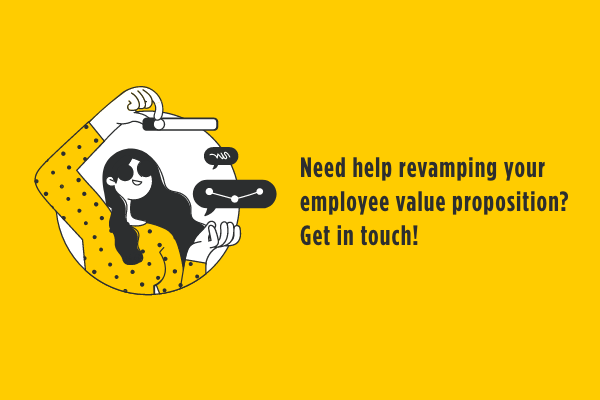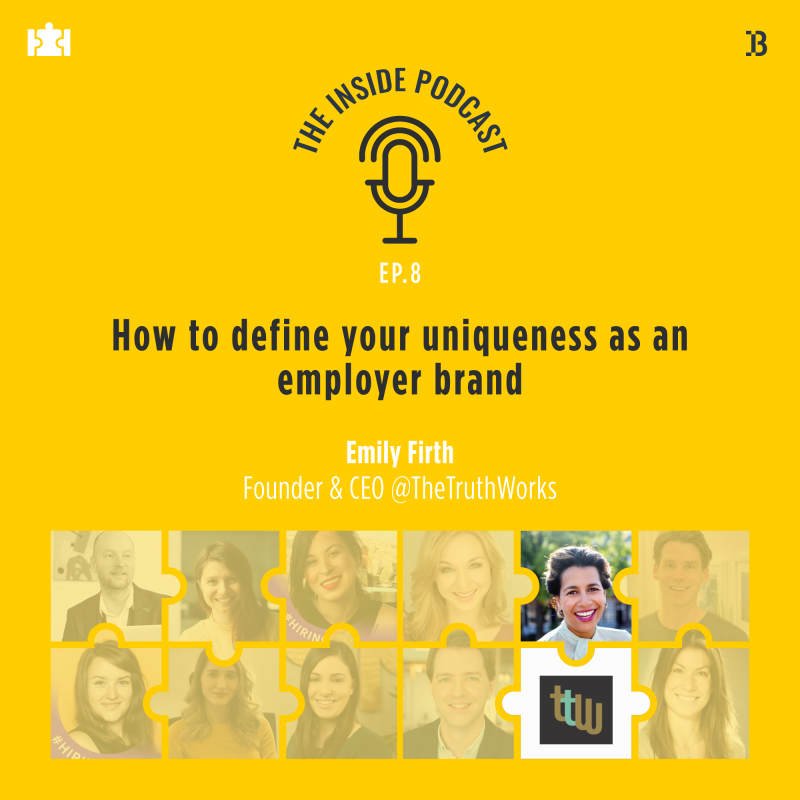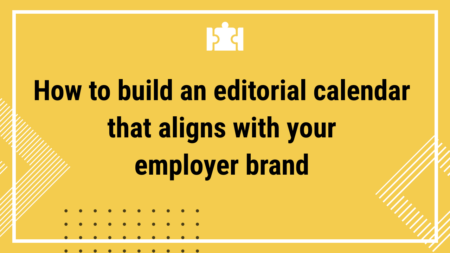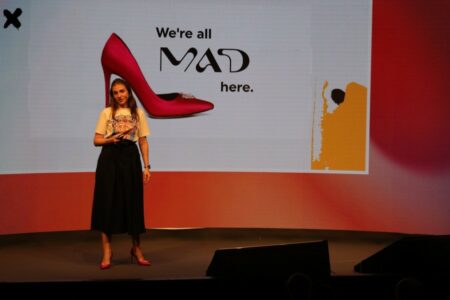Overview
Following a well-deserved summer break, we’re welcoming the autumn season in style with episode 8 of our Employer Branding: The Inside Podcast. This time around, we’ve had the pleasure of speaking with Emily Firth, Global Employer Brand Consultant and Founder & CEO at @TheTruthWorks. We talked about getting at the heart of what makes you unique as an employer, but also about the role of innovation in employer branding. And a whole lot more, so make sure to read more.
What you’ll learn by listening
- How to get at the heart of what makes you unique as an employer
- Core pillars to have in mind when defining your EVP
- The role of innovation in employer branding
- WHO you are as a brand & WHAT sets you apart
- Tapping into your creativity as a company, regardless of size and shape
About the company
TheTruthWorks is an Employer Brand Consultancy based in Amsterdam. “We help companies with EVP development, employer brand strategies, talent attraction marketing, employer brand content and storytelling, employee engagement, leadership communications, internal comms and much more.”
Podcast link – Enjoy listening to S02Ep8 of The Inside Podcast!
Podcast transcription
Georgiana: Good morning, everyone! This is Georgiana from Employer Branding: The Inside Podcast, and today I’m talking with Emily Firth. Good morning, Emily! So nice to have you here.
Emily Firth: Good morning! Lovely to be here on this bright Monday morning. I’ve had some coffee, so I’m ready to go.
Georgiana: Ready to delve right into it! Well, Emily is an Employer Branding Consultant who is based in Amsterdam, and who works with companies all over Europe, I think Emily, right? Because you’re a global employer branding manager.
Emily Firth: All over Europe and in the US as well, so I guess that counts as global.
Georgiana: Great, super nice! So please, Emily, maybe you’d like to introduce yourself and tell us a little bit about what your company does, and what your role is on a daily basis. And of course, why you chose Amsterdam.
Emily Firth: Yeah, no problem. Why I chose Amsterdam may be a longer story. But I just wanted a break from the UK where I’m originally from. So I’ve been here for about eight, nine years now. I used to work in the ad industry mainly for consumer brand transformation. I moved over for a change. About eight years ago, I thought I’d stay a year and I’ve ended up here eight years later. It’s a great city to live in. It’s very entrepreneurial. So it’s a really lovely place to start your own business. Everyone knows everyone. It’s well connected.
There’s quite a lot of support for entrepreneurs. So I found myself staying longer than I expected. But yeah, originally I’m from the UK, I worked in advertising for many years at big companies like Ogilvy & Mather and small digital startups in the UK as well. I ended up in employer branding sort of accidentally. Booking.com was one of my clients when I was on the agency side. I ended up thinking it’d be nice to work for them because I really liked them as a client.
As I was exploring their marketing roles, I came across a role as head of their employer branding team and really helped shape and develop it. And I didn’t really know what employer branding was. But when I realized it was effectively the brand transformation work, I’ve been doing it from the inside out, focusing on culture and people rather than products, I got really excited about the idea.
I moved in-house and went pretty directly into the senior role within a massive organization. So it was my first time on the client side and my first time in employer branding. So it’s quite a baptism of fire, I would say. A lot of things really surprised me about employer branding, realizing that it wasn’t as connected internally within a big organization to marketing and consumer marketing and branding, as maybe I felt it should have been. And also, you know, expecting it to be able to have more impact more quickly than I did, because I saw it as such an important and critical area of any business that was hiring globally.
I spent about two and a half years there really shaping the work and trying to move them from being seen as a travel agency to a big tech company that was really cutting edge for tech employees in particular, and I really enjoyed my time there. We really got under the skin of employer branding and got a taste for it and got passionate about it. And then decided, when I had my first child, not to come back after maternity leave. While I was off, I spoke to a lot of people and actually had time to take a step back and think about what I wanted. And then yeah, I ended up in employer branding as a consultant.
And the work hasn’t really stopped coming to be honest. I think, especially with the pandemic hitting shortly after, there’s a huge appetite and interest in employer branding; really understanding the culture and the impact it has on the overall brand a lot more as well. So it’s been a really exciting, crazy time to be in employer branding. I’ve loved it. I’ve been doing that for almost three years now. And my company is called The Truth Works. Our goal really, is to create employer branding based on insight and based on truth, obviously. We really are focused on getting to the heart of what makes you unique as an employer, and then amplifying it and making it as aspirational as it can be. And recently, I’m expanding the business. So I’m really excited to be growing and taking on more talented consultants as well.
Georgiana: Super. So you talk a lot about the power of an original, non-repetitive employer brand proposition. What is some actionable advice in this direction? You know, like, two or three bullet points we should have in mind when working on our EVP?
Emily Firth: I think trying to be unique is always hard. When you think about it, from a strategic perspective, there’s always going to be people who can offer similar things to you; I think, where you find your uniqueness is in the way you express that idea. A lot of the uniqueness and the differentiation comes through creativity. And a lot of what I’m always trying to push in this area is the boundaries of creativity in the employer branding space.
We tend to be very literal in how we express our ideas. So we want to talk about innovation. We have someone speaking about how innovative the company is, so I always challenge people to show what they mean by innovation – to be innovative, to act in an innovative way is to create content that actually shows innovation, rather than saying innovation.

That’s the way that you can start to think about how I can express this idea in a non literal way. And that actually comes from the inside. It comes from understanding what your audience will be expecting you to show and being able to subvert it. It also comes from knowing how you and only you as a brand would say or approach something like that. I often give an example from advertising, namely from Burger King. A while back, in order to show that the burger was preservative-free, or certainly more preservative-free than a McDonald’s burger, Burger King actually ran an ad which showed a decayed Whopper. So it was a burger that had decayed over the space of a week or a month or whatever. And it was sort of subverting the idea; very polarizing.
But what I would say about that application of creativity, is that it’s something we can learn from. Basically Burger King said, okay, we need to show that we’re preservative-free. So we’ll have a scientist or a farmer, you know, from the business to show how organic and pure and fresh the ingredients are. But they used a combination of insight. Knowing that their audience wouldn’t believe that – because there’s so much cynicism about the fast food industry – you really have to show it and be disruptive, and knowing who they were as a brand, knowing that as a brand, their main goal is diversion and to surprise and shock.
And that’s how they behaved. And usually their goal is also to try and show how they’re different to McDonald’s in the process. And McDonald’s had run loads of campaigns showing their farming process and their mechanic ingredients. It was just a very unique way to express an idea that’s being expressed by a lot of their competitors. I always use these kinds of examples when I’m talking about employer branding, to show that creativity and insight and knowing who you are as a brand is actually the way that you get cut through. It comes through a creative idea. You can have the least original strategy ever, but if you can apply creativity and creative thinking, you can be original.
Georgiana: Would you say this is easier for the more established brands such as Burger King? Or is it the same for the smaller companies? How can companies really tap into their creativity? To make sure they discover the uniqueness?
Emily Firth: I actually think, in some ways, it’s easier for a smaller brand – especially from an employer brand perspective. A lot of these larger brands have a pre established conception from the public and from candidates about who they are, as an employer. As a smaller brand you tend to have a fairly clean slate. The important thing is understanding the parameters of your brand; understanding how you’re going to speak and how you’re going to show up in the world and making sure that that’s consistent because that’s how you start to build a brand over time; it’s really about knowing who you are. That’s more important than having access to huge budgets or being a well-known brand. And in fact, being a well-known brand can hinder you sometimes.
Georgiana: Emily, do you think there are methodologies we can apply when talking about employer branding? And if there are, do they have more to do with human resources or more with marketing? What’s your take on this?
Emily Firth: I think it’s a combination. At the core of it, you have to understand people. And marketers certainly spend time trying to understand people in terms of what makes them buy and what moves them to purchase. I think that employer branding goes deeper than that. And that’s where the HR angle comes in. Because you’re not asking someone to make a short-term transaction, you’re not asking them to buy products which they can return, you’re asking them to make a big decision that I think even more in the last two to three years, we’ve come to understand how much our work impacts our lives, and impacts every aspect of our lives from how much time we can spend with our family to our health and mental well being, for example.
This is a huge decision. And I think you need to apply that understanding of human needs from a career perspective, which is where great HR grounding comes in, which does go deeper than some of the marketing principles. That said, there are some great methodologies in branding and marketing that I don’t see applied often enough to the employer branding space; things like writing a proper brief, things like actually taking the time to gather insight about your audience and about your competitors, things like having a very single minded proposition, understanding a single minded thing that you want to communicate.
Georgiana: You got me really thinking because I think in the end, this is a problem because companies never have an employer branding professional in-house. And when you try to work either with marketing or with HR, you end up having just the best of each of these worlds, but not something that’s combined and not something that’s valuable. So I guess your marketing background is of huge value. I know, it’s the same for me. And it helps us a lot when drafting an employee value proposition and when trying to understand what we want to communicate. So yes, I totally agree.
Emily Firth: Communication skills definitely help being able to tell a story, being able to understand distribution because that’s the piece people forget. They make lovely content, and they put it on their LinkedIn page or their career site. And actually a huge part of marketing is actually going where your audience is. So a broad understanding of targeting and media, etc, is really helpful, even if you don’t understand the detail, understanding the principles that we have to reach people where they are, and we understand what formats will work best for their audience.
Georgiana: The good old buyer persona, right? Emily, what’s a project that you’re super proud of?
Emily Firth: I’m proud of a lot of the work I’ve done mainly because it’s been in really extreme circumstances. Over the last couple of years, it’s been an interesting time to be trying to branch out on your own, and doing things for the first time in some cases, as well. I’m really proud of everything that I’ve done. But I’m particularly proud, I would say one of the first clients that I worked with, who are a big tech company, a global tech company, but mainly HQ out of the US, called Smartsheet; a really lovely software as a service company.
They got very busy during the pandemic because they help people to create software that basically helps people manage their own projects and manage teams remotely, as well. What I’ve worked on with them was everything from sort of mission, vision and values to employer brand. So I really loved being able to properly connect the dots, and build sort of the core communications and purpose foundation with them, which was incredible. It was a very collaborative process. But the story we told, I think, was particularly powerful.
There was a lot of change, obviously, happening in the world. There was a lot of change happening through their organization. But there was also a lot of change happening for their customers who were having to adapt and figure out how to work in new ways. We had this sort of central thought about being the drivers of change. But it expressed itself in a really lovely, creative way. So we turned it into an idea called “we work in progress”. And it was really about how everyone is constantly working in progress there. They are both helping to support progress for their customers, but also for themselves at work, but even deeper than that for themselves as individuals. And it came at a time when we were deep into the pandemic. So a lot of the markets we were working with were in lockdown.
We were really limited creatively as to what we could shoot and also progress just didn’t feel immediate. People were stuck at home, they weren’t going anywhere. Being able to convey the idea that every day at this company, people were working in progress, and felt progress and experienced it themselves, and were the drivers of that progress for themselves, was a really powerful thought, particularly at that time. And we also had to capture it all remotely. A massive shout out to my clients at Smartsheet at the time, Katie Bouwkamp and Kara Hamilton, who were really brave enough to let us sort of self-shoot and self-direct remotely and ask people to capture their stories themselves. And it turned into a really powerful, very human piece, not as polished as anything we usually see in the employer branding space, but I think more than powerful for it. And the stories of individual progress that people told were incredibly moving.

Georgiana: Would you say this is one of the projects that actually changed the lives of the people working for the company?
Emily Firth: I like to think so. I mean, we had some incredible feedback from the employees, who took part and who saw this, and I think it was exactly what people needed at that moment, to really feel like they were moving forward and progressing, even though it felt like the world was standing still around them. So yeah, I felt a lot of energy from it. And I’ve stayed in touch with a lot of the people that we interviewed and spoke to as part of the process. And they still talk about being moved, about being part of that process as well. So yeah, it was an amazing sort of moment in time.
Georgiana: Especially in the pandemic, I guess, right? Can you give me two examples of companies, which are doing a great job when it comes to employer branding?
Emily Firth: If we’re talking about execution, I always love following Hubspot’s social channels. I think they do a great job of putting the power in the hands of the employees. But it still feels curated, it still feels like it’s coming from the same narrative and the same positioning, even though they’ve delegated a lot of the creativity out to the talent themselves.
But it feels very authentic, and you get a real sense of who they are as a business. I always follow them for inspiration in terms of execution. I think though, often a great employer branding comes from your actions and what you actually do as an employer, which is often out of our control as employer branding professionals. But I always cite companies like Chobani, who are really invested in the community both internally and externally. And you really feel it through all their decision-making process. They’re a yogurt brand based out of the US where you’re getting dairy products, I believe.
But the founder is actually an ex refugee himself. And you can see through his work that he actually wants to build up and empower people. That threads right through from giving all employees – right down to the people who work in these factories – equity from the business to empowering them to help other communities to opening factories in areas where he knows there’s high unemployment, and wants to give back to those communities. So you really feel that sense through everything they do; that’s it’s a full cycle and that the brand is built on believing in people. And that definitely translates to their employee experience. I’m always watching them for examples of how to do and show through your actions rather than just talk about it.
Georgiana: Okay, one thing you wish you’d known two years ago about employer branding or company culture or employee engagement?
Emily Firth: Oh, that’s such an interesting question. One thing I wish I had known two years ago … I would have liked to know that the conversations that I was having two years ago will become more mainstream conversations. So I feel like two years ago, I was talking about the connected brand. And the idea that everything you do is a brand and an employer brand, self perpetuating; and they impact and influence each other. And I think it took the pandemic for those conversations to become front page news. So I would have maybe hit my head against a wall less.
I realized that the world would catch up a bit quicker than I thought, due to this catalyst of the pandemic. And it’s all working in different ways. Because I think, you know, sort of the first time that I started seeing things about frontline workers, and how big companies and big brands were treating their workers suddenly became front page news. That wasn’t as much in the public consciousness. As it has been in the last two years, and the idea that the public would boycott brands on the basis of how they treat their employees, and the employees would feel more empowered than ever to be vocal and express discontent with things happening in their company. I mean, I sort of assumed that would be happening a couple of years ago, but I think we’ve only just started seeing it in the last couple of years. It would have been nice to know that that was going to be expedited.
Georgiana: Would you say that it’s easier now to have an employer branding strategy in place? Is it easier now to do employer branding?
Emily Firth: No! I’d say it’s easier to have bigger conversations. I’d say the stakes are higher, and the landscape is more complex, and there are more eyes on the work. I think it’s easier to have an impact if you’re the kind of person that can elevate the conversation and join the dots. I think for the internal employer brand person, it’s become more complex, because suddenly branding definitely won’t be involved. PR definitely wants to be involved, which are all good moves, but they do make the day to day harder. And they mean that actually a lot of your job has to be about influencing and understanding the interconnectedness between those. So I think it’s become a more complicated job in some ways. But I think the opportunity and the ability to influence is much richer.
Georgiana: I see it the same way. Yeah. So we are reaching the end of our lovely conversation. And one thing that I ask all my guests when we reach the end is to suggest a resource that’s been instrumental in what they’re doing that has helped them a lot on their day to day projects. It can be a blog article, or I don’t know, a podcast or a book, whatever you feel has helped you.
Emily Firth: Okay, I’ll list two if that’s okay. Because one is slightly broader. So I would say for employer branding content, I always love following James Ellis’s employer brand headlines. I think they’re well put together, thought through, considered and really interesting. But I also like to keep an eye on things outside of employer branding, because I think otherwise, we miss the bigger business context with the work that we’re doing, and often you can build great insight from just reading about the world.
I also find reading the Harvard Business Review, or the Economist, or just anything that tells you a bit more about the state of business, and the world, or Business Insider is also really interesting. I would just say, try and keep your reading broad. I think we can get a bit in our own little employer brand bubbles and our employer brand, if it’s anything that does not exist solely in the minds of candidates and employer brand marketing managers. I think it’s really important to place everything that you do in the context of what’s going on in the world.
Georgiana: I totally agree. And I think the more you expand your reading circle, the more creative you get. At least, that’s what happens to us whenever we work on our creative campaigns for employer branding. Super. Emily, thank you so much for talking to me this morning. This has been really, really interesting and fun. And I wish you good luck in growing the team and in getting the most interesting projects ever.
Emily Firth: My pleasure, thank you! It’s been really lovely to talk to you, too. Always love starting the day with some inspiration. It was really lovely to meet you and I hope to meet face to face in Berlin.
Georgiana: With pleasure, it would be really, really nice to get a cup of coffee finally face to face this year. Thank you so much, Emily, I’ll be in touch.
This was Employer Branding: The Inside Podcast. You can find our podcasts on Spotify on Apple podcasts and content on employer branding-related things on employerbranding.tech. Until the next time, stay tuned.







